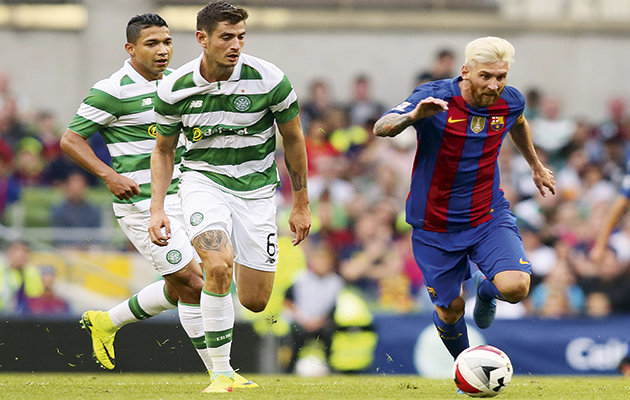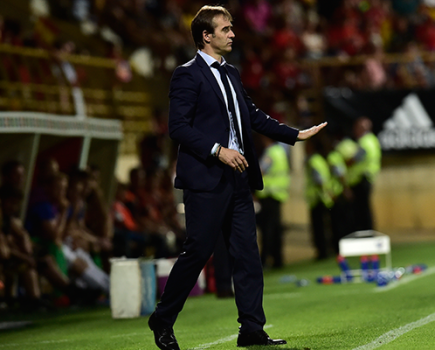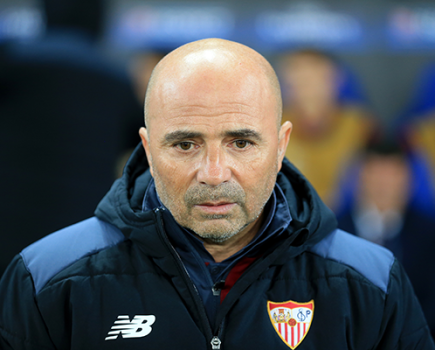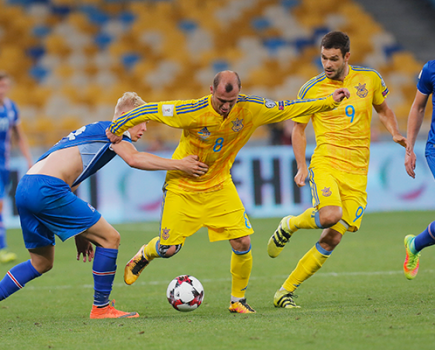Cristiano Ronaldo and Lionel Messi just can’t be separated, and they can’t be kept off the front pages either – not even when they go on holiday. There they were, in a port somewhere in Ibiza, and on newspaper covers all over Spain. With Messi’s boat moored just metres from Ronaldo’s boat, a meeting was imagined. “What would they talk about?” asked one editorial, with an open invitation for readers to insert their own punchline.
The new season, perhaps? Pretty much everyone else was – when they weren’t picking through the bones of Spain’s Euro 2016 exit.
At this time of year, everyone is optimistic, everyone has hope and everyone has a chance. Well, not everyone exactly, but you get the point. And the new campaign does begin with an optimism that is unusually widely spread in Spain.
For starters, it looks like this season might even kick off on time for a change – with seemingly no threat
of strike action, no TV blackout, no fans protesting in the streets, no teams rescued or relegated off the pitch.
There are still problems to be confronted, of course. The on-going war between the federation and the league could yet claim more victims, and the way supporters are treated remains as scandalously bad as much of the TV coverage. But Spanish football has reduced its debt to players to almost zero, according to Liga de Futbol Profesional president Javier Tebas, who has been pursuing an aggressive policy of debt reduction over the last five years.
Some of the financial controls and penalties placed on clubs, which include salary limits and signings being suspended, as well as relegations, have not been popular. At times, there have even been accusations that they have not been uniformly applied. But now Tebas says the results have proven the approach to be the right one.
In 2010-11, 28 clubs had been formally reported for failing to pay players, with 341 complaints made and the total amount owed almost €90million. Five years on, there are just six clubs who have formal complaints against them and the total amount outstanding to players is €189,959.
Those six, Tebas insists, are not the all-too-common case of a club simply not paying; they are, rather, complaints where there is a disagreement over the interpretation of the contract and the amount owed. In other words, the clubs may yet be found to be right. “Right now, every Spanish club are up to date with their players, claims Tebas. “And I don’t think that has ever happened in the history of Spanish football.”
Nor is it just the players. In 2012, Spanish football’s collective debt to the country’s Inland Revenue stood at €643m. Now the figure is closer to €200m and Tebas says that, while deals that have been agreed between the state and clubs as part of their administration packages cannot be challenged, he hopes the figure will be zero by 2020.
Tebas described this as an historic moment, a chance to clean the slate and get it right. It goes hand in hand with, at last,
a centrally controlled television deal and a policy of expansionism and a clearly stated intention to overhaul the Premier League.
It is good news, but first a warning: there is a long way to go and realistically they may not get there. They almost certainly will not, in fact. Not yet. And certainly not commercially, at least.
This summer has seen Spanish interest in the Premier League grow, not diminish. How could it not with Jose Mourinho against Pep Guardiola in Manchester and over 30 Spaniards playing in England? The money generated by English clubs dwarfs that of La Liga teams. Take Atletico Madrid, who aspire to take as much in domestic revenue as the teams relegated from the Premier League. Spanish players know that they can earn more in the Championship than at many top-flight teams in Spain.
Some of the improvements can be questioned too. For example, there is something tellingly superficial about new league rules that will see clubs punished if they do not fill those parts of the ground seen by the main camera on TV.
For all the efforts to make La Liga the product rather than just Real Madrid and Barcelona, those two clubs’ dominance of supporterdom in Spain, where they account for over 60 per cent of fans and utterly dominate the media agenda, is an inescapable reality too. Internationally, where Tebas wants to expand, they dominate even more. Meanwhile, there
are still very clear “Monday” clubs – those who are exiled to the same old TV graveyard slot time and again, their secondary status thus reinforced.
However, the reduction of debt has provided the stability from which Spain’s footballing authorities claim they can grow. Base-rate salary caps will increase, for a start. The new collective deal brings more money to the country’s “other” clubs –
even if while that was being prepared, the announcement of the Premier League’s new deal came as a huge threat – and so, of course, does the continuing ability to develop players.
It is the football itself that keeps Spanish clubs afloat. Spain’s coaching is the best in Europe, all the way through the system, and there is a reason why there are so many Spanish players in the Premier League. English clubs, simultaneously a threat and a lifeline, provide a market for La Liga club’s, a revenue stream. Now the hope is that they can aspire to more than just surviving. The books are starting to become more balanced, while foreign investment both reflects and enhances the sense that they can begin generating money.

Atletico Madrid holding on to Antoine Griezmann is seen as a sign of the growing strength of Spanish football.
For now, there’s a certain optimism. Cautious perhaps, soon to be undone possibly, but it is there.
Maybe it is just the usual summer haze, the hope before it is inevitably taken from them, but there is something attractive about Spain next season. They have five teams in the Champions League again and have won the last six European club titles, as well as having two losing finalists.
Atletico Madrid, for a change, have not had their best players picked off, starting with Antoine Griezmann, who signed a new deal. Indeed their intention is to add to their team – and they are not alone.
Sevilla may have lost players, but there is excitement about them under new coach Jorge Sampaoli.
Espanyol, under new ownership and with Quique Sanchez Flores in charge, look like they may be worth keeping an eye on this term, Villarreal were European semi-finalists last year, and surely Valencia can’t be as bad as they were last term?
Then there’s the very top end. If Real Madrid’s intention is usually to sign the star of a summer tournament, this year it wasn’t possible. Mainly because Euro 2016’s best players are already in Spain. The Copa America’s best, even if he was defeated in the Final, is too.
Spain has Luis Suarez, Gareth Bale, Neymar, Modric, Iniesta and Griezmann. And of course Ronaldo and Messi – neighbours in Ibiza this summer, rivals in La Liga and beyond for another season.







